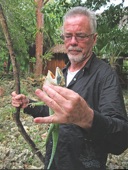Robert Trivers
President
Biosocial Research Foundation
Millstone, NJ
triversr@gmail.com
New Movie
His most recent movie (September 2024) is Wild Genius: Why we do what we do (Amazon Prime Video) (AppleTV+)

New Book

His most recent book (November 2015) is Wild Life: Adventures of an Evolutionary Biologist (Amazon)
Available in Jamaica at Fontana Pharmacy (Fontana)
Now available in Spanish: Vida indomita (Amazon)
Unlike other renowned scientists, Robert Trivers has spent time behind bars, drove a getaway car for Huey P. Newton, and founded an armed group in Jamaica to protect gay men from mob violence. Now, in the entertaining tradition of Surely You’re Joking Mr. Feynman, Trivers tells us in his inimitable voice about the inimitable life behind the revolutionary science.
“Who would have guessed that arguably today’s most original thinker in evolutionary theory could possibly have led the extraordinary life Robert Trivers recounts in these pages. We are taken on a wild trip from inspired meditations on the biology of self deception, through a steamy Jamaican underworld, to Black Panthers in California, to frank appraisals of distinguished or over-rated scientists, the whole adding up to a disarmingly frank and utterly unique memoir of a rollercoaster of a life.” —Richard Dawkins, bestselling author of The Selfish Gene

“This memoir is filled with sharp and hilarious observations about the living world, not least a certain species of hairless primate, not least a certain member of that species named Robert Trivers.” —Steven Pinker, author of The Better Angels of Our Nature
“It would not be hyperbole to say that Robert Trivers is one of the most important evolutionary theorists since Charles Darwin. A lust for life doesn’t begin to sum up a career devoted to truth, courage, and the audacity to think what no one else has thought. If that were not enough, Trivers is witty, clever, and compassionate. This book is destined to become a classic in scientific autobiography.” —Michael Shermer, Editor Skeptic, columnist Scientific American
Book reviews:
LA Times
Current Biology
The function of this webpage is to draw attention to my recent books and to provide easy access to all my work. Thus, under Publications you can find links to pdf’s of all my scientific papers and two of my books. Under Books are links to buying copies of my books. There are many links to articles about me or my work, including links to foreign language pieces. There are also links to the sordid way in which my own University chose to act against me.
At this time (Nov 2016), I am working on a biological theory of honor killings based on the effect of repeated first cousin marriages on degree of relatedness to close relatives. In short, a repeated history of first cousin marriages elevates degrees of relatedness in all directions thereby devaluing the relative value of one’s own child, typically daughter. I am also working with others to try to understand the distribution of heterogamety in nature. That is, which sex is XY and which XX. In mammals the male is XY in birds the female is XY.
My most recent interview is a Profile by Ian Boyne, a superb Jamaican recently deceased at age 60 on December 18 in Kingston Jamaica after a heart attack suffered two weeks before. He is one of the few truly great Jamaicans along with Peter Tosh I have been privileged to meet.
TEDX Talk on deceit and self deception in Kingston Jamaica
This is the best talk I have given on self-deception, in part because TEDx talks are limited to ~20 minutes and in part because it is delivered in Jamaica with many local references.
Clips from Zagreb Croatia
Robert Trivers thinks everything is ‘fine’ during 4 lectures
Lecture 1: An Evening on Evolutionary Biology An overview covering Feminism Transgender Homose
Lecture 2: Recent Advances in Human Evolutionary Genetics
Lecture 3: The logic and role of deceit and self deceit in human life
Lecture 4: Challenges of teaching evolution in the age of ignorance